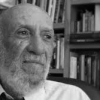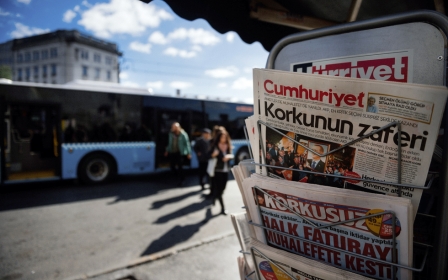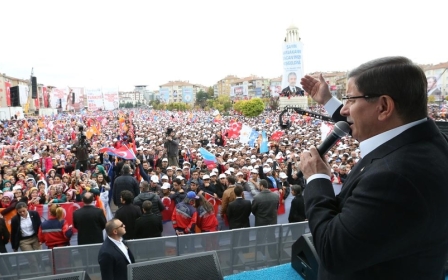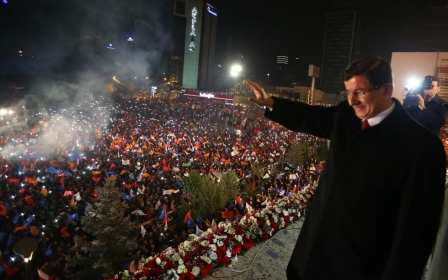The perils of Turkish polarisation
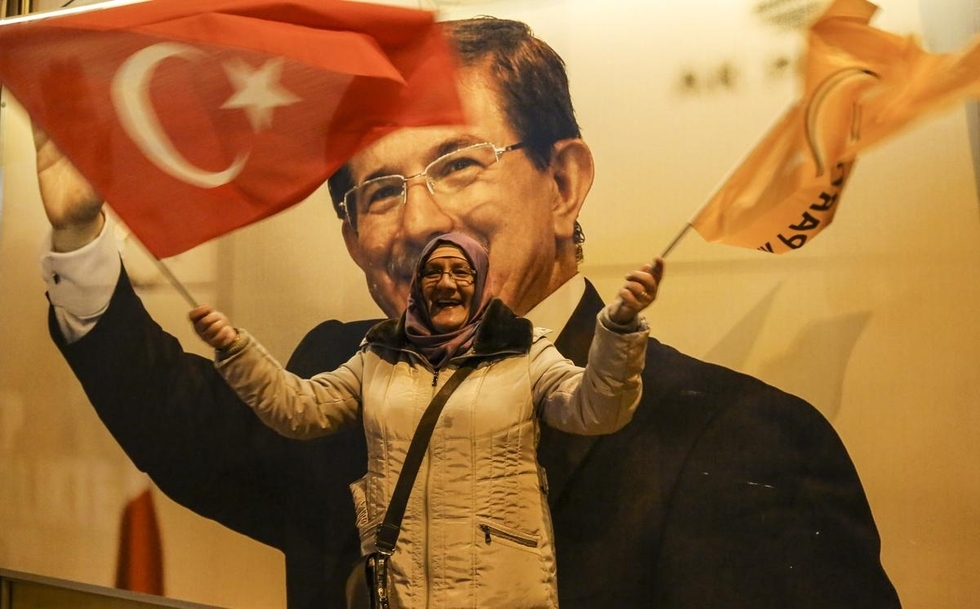
The elections in Turkey on 1 November have produced an unexpected swing to the governing AKP, winning 49 percent of the vote, a majority of 316 deputies to form a new government. Most pre-election polls had predicted a very different outcome, projecting an inconclusive result resembling the June outcome when the AKP won only 41 percent of the vote, allowing it to take the lead in what turned into a failed effort to form a coalition government.
The controversial president, Recep Tayyip Erdogan, called so-called “snap elections” to overcome the deadlock, which many blame him for causing. But it can only be called a "victory" for the AKP if it manages a process of depolarisation, and few in the opposition are at this point even willing to entertain such a possibility.
Allegations of fraud for which there is presently no credible evidence will not help clear the air, but when results vary so sharply from expectations, and distrust pervades the Turkish scene, the losers are bound in various ways to cry “foul”. This will, at least temporarily, intensify polarisation, and likely create a crisis atmosphere.
There are two main explanations for AKP victory: a greater effort to get out the AKP vote and a quite rational feeling by voters on the fence that only the AKP could provide the unity and stability needed to restore the stagnating economy and cope with the security challenges posed by Kurdish militancy and ISIS terrorism. There are also severe challenges associated with the continuing refugee spillover from Syria, threatening to surge once more in response to the Russian intervention.
Despite the severity of these security concerns, I regard the biggest challenge will be to find ways to reverse the downward spiral of toxic polarisation. The secular opposition continues to explain all that has gone wrong to be the fault of Turkey’s president. Erdogan is accused of destroying Turkish democracy, provoking the renewal of the Kurdish conflict, pushing a failed sectarian policy in Syria, and even being at least indirectly responsible for the horrifying Ankara bomb explosions. Above all, the opposition insists that Erdogan seeks absolute power, and is pushing for parliament to rewrite the constitution in a way that ends parliamentary democracy and opts outright for a presidential autocracy.
Clash of narratives
The government response to these charges is varied, but explicitly focuses on the national imperative of political unity in a multi-faceted struggle against various challenges that it provocatively demonises as “terrorism,” treating as one Kurdish renewed violence, ISIS, and the counterinsurgency tactics of Bashar al-Assad’s Syrian regime.
Immediately after the election results the political leadership in Ankara renewed its call for unity, claiming the victor in the elections is the Turkish nation, but unless Erdogan convincingly moderates his ambition and tone, polarisation will worsen with dire outcomes becoming daily more likely. Depolarisation requires acts beyond words, and the good faith of mutual recognition if efforts are made.
In my view, neither pole is entirely to blame for this dangerous state of affairs, and as the situation has worsened neither pole has exhibited any interest in finding common ground and political calm. Between 2002 and 2011, polarisation was one-sided, mainly the work of opposition forces that showed their contempt for all that the Erdogan leadership achieved, insisting that impressive reforms were explained as pragmatic moves to satisfy EU membership criteria, and were really a cover to hide a secret agenda of moving the country toward becoming an Islamic republic, “a second Iran”.
This unremitting hostility in the early period did not weaken public support for the AKP-led government. Such attacks were disregarded by the majority of Turks throughout the country. The AKP continued to win a series of elections by growing margins. Many benefitted from the strong economic performance, the social protection measures, and by a dynamic foreign policy that asserted Turkey’s diplomatic independence, opened up trade and investment opportunities, and expanded relations with Africa, Latin America and Asia.
In these years, the AKP and Erdogan did not react aggressively to this incessant barrage of harsh and mostly irresponsible criticism, often accompanied in opposition circles by audible hopes for a military coup. It was becoming more and more apparent that the opposition lacked the popular support to win back power by democratic means, and so alternatives became tempting. This general drift toward deepening polarisation became further intensified internationally after Turkey broke sharply with Israel starting in 2009.
Erdogan strikes back
After the 2011 elections when the AKP won its most resounding electoral victory, Erdogan finally started striking back. He claimed the backing of the Turkish nation as if the opposition didn’t exist, and seemed determined to force his will upon all who disagreed.
In recent years, Erdogan became crudely dismissive of all criticism. Especially after using excessive force to control the Gezi Park demonstrations in 2013, the opposition at once beleaguered and embittered raised the ante by openly questioning Erdogan’s legitimacy as a leader.
A polarised society leads most of the citizenry to identify with one of two poles that are antagonistic in ways that preclude the sort of debate on policy choices and cooperation and compromise upon which a functioning democracy depends. As a result all efforts to address shared challenges to Turkish interests are beset by a discourse of recrimination and accusation, a constant barrage of inflammatory rhetoric is directed at the government that give rise to political paranoia. It is this interaction that has resulted in toxic polarisation with the opposition disregarding the legitimacy of the government and the government undermining the rights of the citizenry.
There are serious threats to democratic public order that the AKP must now face. If the Kurdish violence persists it may tempt the leadership to declare a state of emergency accompanied by martial law. Or contrariwise, it could induce the military to justify a coup, which would have popular support among the secular minded in Istanbul and Ankara. Such developments could also lead an already frustrated Kurdish movement to decide that with Turkey so divided, this was the moment to launch a full-scale civil war. ISIS might also engage in a variety of terrorist acts to frighten the Turkish people, making normal economic activity impossible.
Despite these many dark clouds floating across Turkish skies, there are also hopeful alternatives created by the AKP victory, depending on the realisation that the current degree of polarisation is unsustainable.
Step forward Davutoglu
In my assessment, no mention has been made up to this point of the Turkish prime minister, Ahmet Davutoglu, but his role is indispensable if a turn toward moderation is even conceivable. It is a potential Davutoglu moment, but he must be willing to do what he has not openly done up to this point: assert his leadership and induce Erdogan not to interfere with the formation of a new government.
Only Davutoglu possesses the stature and degree of flexibility that would give such an approach some chance of working.
In the year since Davutoglu became prime minister, he has been treated by the opposition as either a puppet of Erdogan or as a compliant junior collaborator. Whether this image is true or not is almost irrelevant because the mainstream media and public opinion treat the political struggle as one pitting Erdogan against the defenders of the Turkish republic as established by Kemal Ataturk in 1923.
Those in the opposition see their mission as being one of stopping Erdogan at all costs and by any means. And on the other side, Erdogan backers believe that only a strong presidency under his leadership can keep order in the country, and that the opposition is hell bent on making the country ungovernable, whatever the consequences.
It is up to Davutoglu to seize this historic moment to put forward a constructive political vision, asserting a non-partisan moderating dedication to the unity and security of the country that must include a credible plea for peace and reconciliation with the Kurds and the HDP.
Although the electoral outcome is being mainly portrayed as Erdogan’s triumph, his historical role as the greatest Turkish leader since Ataturk can only be redeemed if he backs off a stubborn insistence on an enhanced presidency. It is this combination of Davutoglu assertiveness and Erdogan prudence that might restore the positive trajectory that made the early AKP period of governance a success story for Turkey.
Only such unlikely moves would allow a depolarising healing process to begin. Perhaps such conjectures are but a dream that can never come true. But without dreaming of a better future for Turkey we are only left to ponder a variety of nightmares.
- Richard Falk is an international law and international relations scholar who taught at Princeton University for 40 years. In 2008 he was also appointed by the UN to serve a six-year term as the Special Rapporteur on Palestinian human rights
The views expressed in this article belong to the author and do not necessarily reflect the editorial policy of Middle East Eye.
Image: Supporters of Turkey's Justice and Development (AK) Party gather to celebrate the general election results outside the AK Party's headquarters in Abana district of Kastamonu, Turkey on November 01, 2015. (AA)
New MEE newsletter: Jerusalem Dispatch
Sign up to get the latest insights and analysis on Israel-Palestine, alongside Turkey Unpacked and other MEE newsletters
Middle East Eye delivers independent and unrivalled coverage and analysis of the Middle East, North Africa and beyond. To learn more about republishing this content and the associated fees, please fill out this form. More about MEE can be found here.


